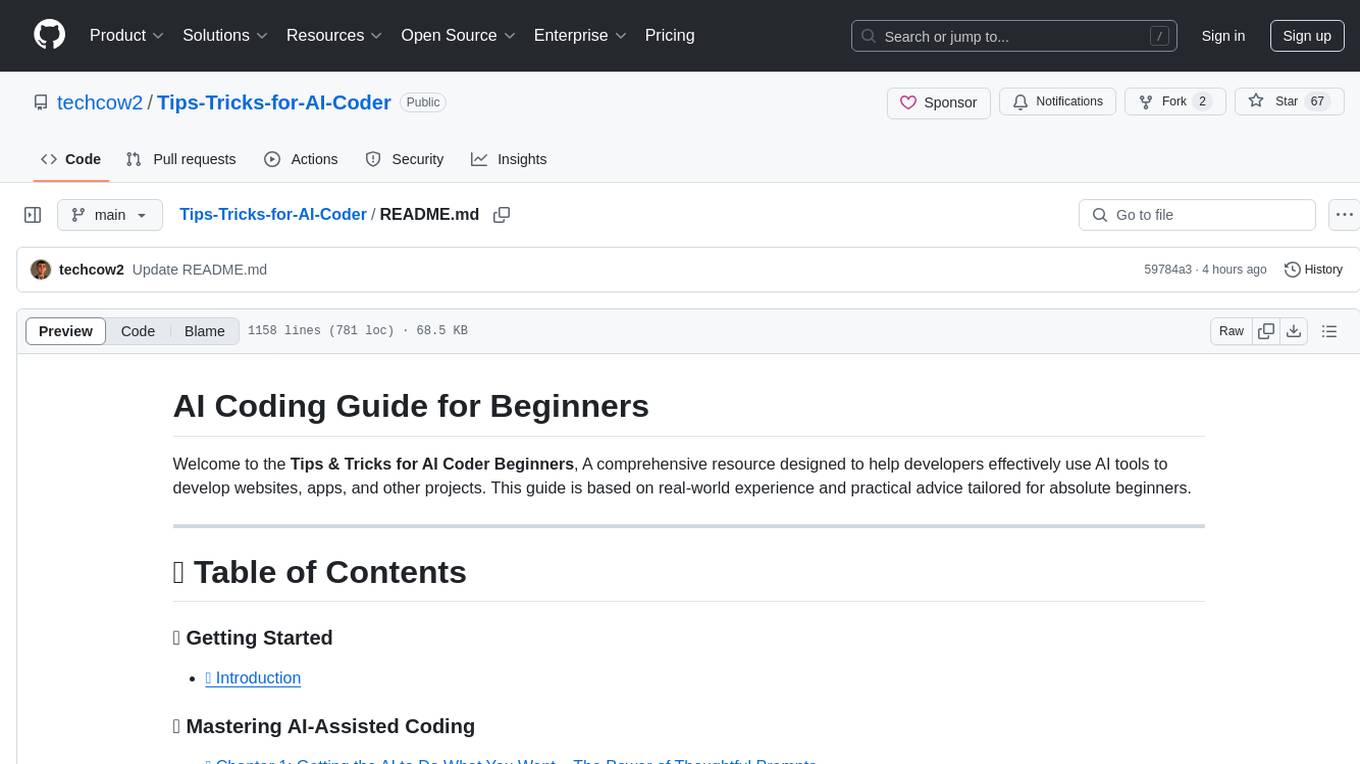
talk-to-chatgpt
Talk to ChatGPT AI using your voice and listen to its answers through a voice
Stars: 1945
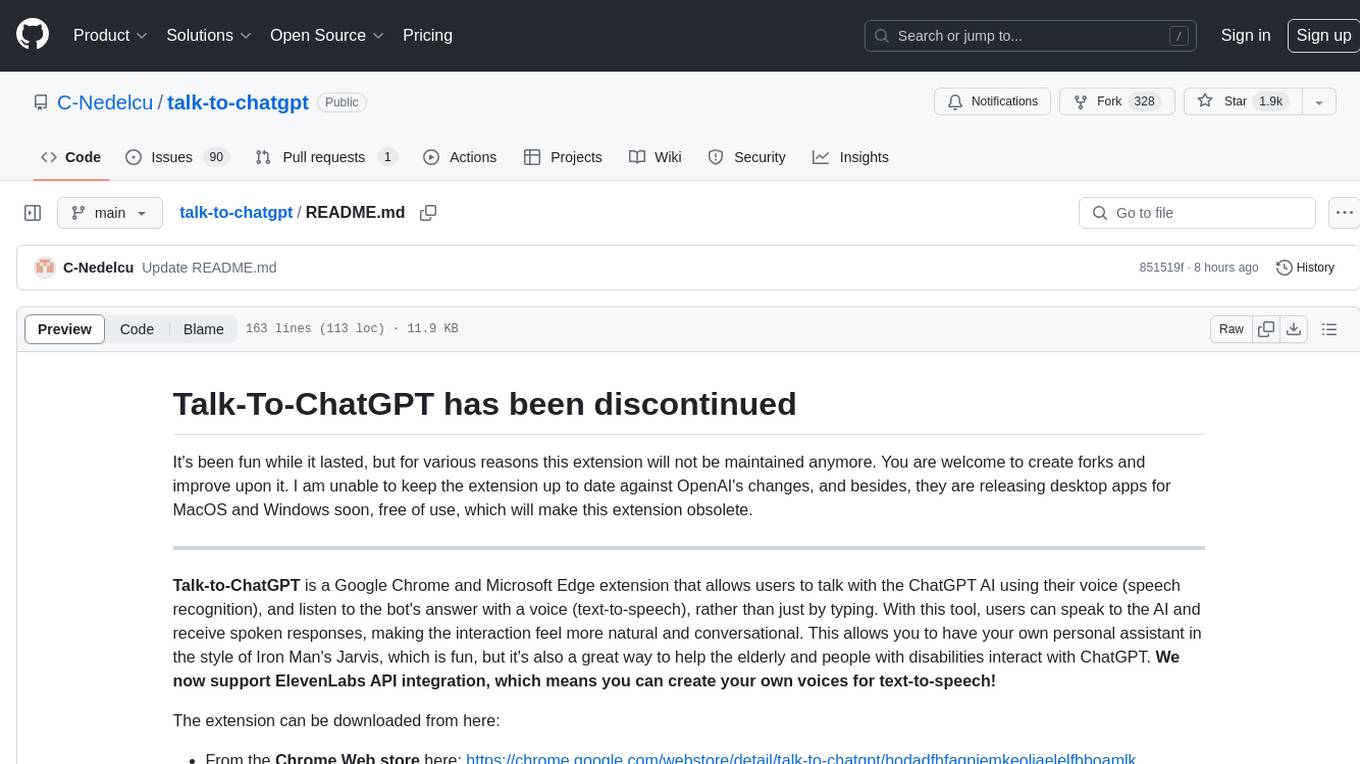
Talk-To-ChatGPT is a Google Chrome and Microsoft Edge extension that enables users to interact with the ChatGPT AI using voice commands for speech recognition and text-to-speech responses. The tool enhances the conversational experience by allowing users to speak to the AI and receive spoken responses, making interactions more natural and engaging. It also supports ElevenLabs API integration for creating custom voices for text-to-speech. The extension provides settings for voice, language, and more, and can be installed from the Chrome and Edge web stores or manually. While the project has been discontinued due to upcoming desktop apps from OpenAI, it has been used to assist individuals with disabilities and the elderly in interacting with ChatGPT.
README:
It's been fun while it lasted, but for various reasons this extension will not be maintained anymore. You are welcome to create forks and improve upon it. I am unable to keep the extension up to date against OpenAI's changes, and besides, they are releasing desktop apps for MacOS and Windows soon, free of use, which will make this extension obsolete.
Talk-to-ChatGPT is a Google Chrome and Microsoft Edge extension that allows users to talk with the ChatGPT AI using their voice (speech recognition), and listen to the bot's answer with a voice (text-to-speech), rather than just by typing. With this tool, users can speak to the AI and receive spoken responses, making the interaction feel more natural and conversational. This allows you to have your own personal assistant in the style of Iron Man's Jarvis, which is fun, but it's also a great way to help the elderly and people with disabilities interact with ChatGPT. We now support ElevenLabs API integration, which means you can create your own voices for text-to-speech!
The extension can be downloaded from here:
- From the Chrome Web store here: https://chrome.google.com/webstore/detail/talk-to-chatgpt/hodadfhfagpiemkeoliaelelfbboamlk
- From the Edge Web store here: https://microsoftedge.microsoft.com/addons/detail/talktochatgpt/bkkdkngklccknmoalpoakglipbibafpn
- Manual installation option, detailed further below
After installing the extension, open or reload the ChatGPT page ( https://chatgpt.com/ ) and you should be seeing a 'Start' button on the top right corner of the page. After you click Start, you will be asked for permission to use your Microphone. This is required to enable voice recognition.
Once started, Talk-to-ChatGPT displays a menu on the top right corner of the page where users can access settings (such as voice, language, and more), skip the current message, toggle voice recognition on or off, and toggle text-to-speech on or off.
The settings menu can be seen below. Settings are saved in a cookie and reloaded automatically each time you activate the script.
Demo V2.6 with ElevenLabs support: https://www.youtube.com/watch?v=gnijfWuenKA
- Google Chrome: download from the Chrome extension store at https://chrome.google.com/webstore/detail/talk-to-chatgpt/hodadfhfagpiemkeoliaelelfbboamlk
- Microsoft Edge: download from the Edge extension store at https://microsoftedge.microsoft.com/addons/detail/talktochatgpt/bkkdkngklccknmoalpoakglipbibafpn
If the extension is temporarily unavailable (this can happen when OpenAI make breaking changes), or if you want to install the latest updates before they are available on the Chrome/Edge web store, you can install the extension manually. Here is how you do it.
- Download the .zip file here: https://github.com/C-Nedelcu/talk-to-chatgpt/raw/main/chrome-extension/chrome-extension.zip (this link will always point to the latest version)
- Extract the .zip file in a folder somewhere
- Follow this tutorial to install the extension in Chrome/Edge in dev mode: https://webkul.com/blog/how-to-install-the-unpacked-extension-in-chrome/
Q: Which web browsers are supported? A: This extension is designed for Google Chrome and Microsoft Edge, desktop version only. The extension will not work in any other web browser, especially not mobile browsers, because these browsers do not support the necessary APIs for speech recognition and speech synthesis.
Q: Can you make it speak faster or in a different voice or language? A: Yes, use the settings menu. You can select a variety of settings among which the speech rate, voice type, and language.
Q: What is the purpose of this project? A: Originally, it was mostly a fun proof of concept. This AI is mind-bogglingly intelligent and I had a deep desire to converse with it orally, to make it more interesting. Surely OpenAI themselves will make a proper voice-controlled version of ChatGPT in the future, at which point my project will be rendered useless. For now, it seems to be helping people with disabilities / visually impaired people, so I'm going to be actively working on the project for as long as I can, as a form of contribution to society.
Q: Is it safe to use? A: Yes, it's simple javascript code that will execute only in the context of the ChatGPT webpage. It doesn't request any particular permissions, and it is fully open source. As soon as you navigate away from ChatGPT, everything is cleared, except for the addon settings.
Q: Will it always work? A: it might not work indefinitely, and here's why. The code is based on the current HTML structure of the ChatGPT page. If OpenAI change the HTML code, this project will likely stop working. I will probably keep updating it to maintain compatibility, but I'm not sure I'll be doing that forever. If you want to contribute to the project you are more than welcome to submit your own changes through Github.
Q: I have an error or a problem... A: Feel free to update the javascript yourself and propose changes on Github, or simply report the issue if you aren't a programmer.
Q: Can I make changes to your code? A: Yes, feel free to make changes, and do whatever you want, commit, fork, just have fun.
Q: How do I know what languages are supported? A: this is entirely based on the web browser APIs (Google Chrome, Microsoft Edge), so you need to ask Google or Microsoft, as I cannot provide an up-to-date answer. I've only tested it with English, French, and Chinese. The languages in the settings menu are the same ones found on the Google and Edge demos.
Talk-to-ChatGPT has been receiving press coverage since its release. It is currently featured on the following sites:
- BGR.com - https://bgr.com/tech/free-talk-to-chatgpt-chrome-extension-gives-ai-a-voice/
- GeekFlare - https://geekflare.com/best-chatgpt-chrome-extensions/
- NerdsChalk - https://nerdschalk.com/talk-to-chatgpt/
- MakeUseOf - https://www.makeuseof.com/chatgpt-chrome-extensions-better-ai-prompts-answers-in-browsers/
- TechBriefly - https://techbriefly.com/2023/03/30/how-to-talk-to-chatgpt/
- Skool.com - https://www.skool.com/chatgpt/fancy-a-real-time-voice-conversation-with-chatgpt
- GBAtemp - https://gbatemp.net/threads/talk-to-chatgpt-actual-vocal-discussion-with-an-ai-using-voice-recognition-and-text-to-speech-in-chrome.622942/
- JustGeek - https://www.justgeek.fr/talk-to-chatgpt-discuter-a-voix-haute-avec-chatgpt-103657/
- Comment Ca Marche - https://www.commentcamarche.net/informatique/technologies/27295-application-et-extension-vocale-chatgpt-de-nouveaux-outils-pour-l-ia/#talk-to-chatgpt--discuter-a-haute-voix-avec-lia
- Le Blog du Moderateur - https://www.blogdumoderateur.com/meilleures-extensions-chrome-chatgpt/
- JackGPT - https://www.youtube.com/watch?v=IlaOq9dFZnA
- This list will be updated over time.
Version 2.9.0 - December 3rd, 2023
- New: added Azure Text-To-Speech (#210) Full credits: lout33
- Updated: ElevenLabs - added eleven_english_sts_v2 and eleven_turbo_v2 models
- Fixed: ElevenLabs - cloned voices can now be used with all models (#200)
Version 2.8.1 - October 9th, 2023
- Fixed: conflict with OpenAI's new image upload functionality (#189)
Version 2.8.0 - September 30th, 2023
- Updated: more compact widget (#186)
- Updated: lot of code refactoring and cleanup (credit: PxPerfectMike)
Version 2.7.2 - September 23rd, 2023
- New: added an option to prevent the text-to-speech engine from reading emojis (#166) Credit: PxPerfectMike
- Updated: added a note in the voice command setting area to remind users that voice control only works when the microphone is active
- Fixed: red bar indicating microphone activity didn't activate after a pause or complete stop
Version 2.7.1 - September 17th, 2023
- Updated: initial position of the widget lowered a bit so that the ChatGPT 'Share Chat' icon is visible (#163)
- Updated: in the ElevenLabs voice list, it is possible to select v1 or v2 multilanguage model
- Fixed: monolingual voices in ElevenLabs didn't work in v2.7.0 due to a mistake in the API code
Version 2.7.0 - September 16th, 2023
- New: browser warning on first use to better inform those who are not running supported browsers
- Updated: switched to ElevenLabs v2 models for better text-to-speech quality (#168)
- Fixed: CRITICAL - ElevenLabs text-to-speech stopped working due to a CSP update from OpenAI. All ElevenLabs TTS playback was migrated to 'offscreen' (#177, #176, #169...)
- Fixed: prevented commas within numbers from breaking sentences (Credit: decfrr)
Version 2.6.1 - June 3rd, 2023
- Fixed: major issue with ChatGPT page update preventing from sending the prompt (#127, #128, #129, #130, #131)
- Fixed: saving settings wasn't working when the list of system text-to-speech voices was empty (#125)
Version 2.6.0 - April 29th, 2023
- New: ElevenLabs API support (#70, #41, #34)
- Updated: beep tone at the start instead of saying 'OK', so as to avoid consuming ElevenLabs quota
- Fixed: stability improvements
Version 2.5.0 - April 25th, 2023
- New: beep tones when pausing and unpausing (#83)
- Updated: the pause word will work even when spoken twice instead of once, to tackle issue with the speech recognition API
- Updated: settings menu divided into sections
- Fixed: forbid punctuation in voice commands as they may break settings storage
- Fixed: text-to-speech sometimes wouldn't work when 'skip code blocks' option was enabled due to jQuery issue
Version 2.4.0 - April 24th, 2023
- New: the widget can be dragged around
- Fixed: issue with jQuery being unable to read message contents and speak out loud
Version 2.3.0 - April 18th, 2023
- New: option to skip code blocks while reading bot's response (#17)
- Fixed: when speech recognition returns an empty sentence, this could cause the addon to disfunction (#72)
Version 2.2.0 - April 16th, 2023:
- New: 'pause' vocal command was revamped. When you say the pause word, the addon will continue listening but won't send anything to ChatGPT. To resume normal functionality, say the pause word again, or click the Resume button
- Updated: minor UI and text updates here and there
- Bugfix: when the addon is started in the middle of a conversation with ChatGPT, the last message received was always spoken out loud. It won't be the case anymore.
Version 2.1.0 - April 15th, 2023:
- New: UI was revamped. Credits to pixelsoda and Shaun James
Version 2.0.2 - April 15th, 2023:
- Fixed: the addon will properly activate on every ChatGPT conversational pages
Version 2.0.1 - April 14th, 2023:
- Fixed: the ChatGPT URL was changed by OpenAI, therefore disabling the addon
Version 2.0.0 - April 10th, 2023:
- New: keyboard shortcuts to control the addon. The shortcuts are listed in the settings menu or appear when you move the mouse over the UI buttons
- New: an option to avoid breaking down sentences with commas or other punctuation marks such as colons and semicolons
- Fixed: vocal commands such as the stop and pause words wouldn't always work because the speech recognition would add a dot at the end
For older change logs, please check the commit messages: https://github.com/C-Nedelcu/talk-to-chatgpt/commits/main
Thanks for reading all the way down. Are you enjoying Talk-To-ChatGPT and want me to continue improving it? You can help by making a donation to the project. Please click the Donate button to proceed.
For Tasks:
Click tags to check more tools for each tasksFor Jobs:
Alternative AI tools for talk-to-chatgpt
Similar Open Source Tools

talk-to-chatgpt
Talk-To-ChatGPT is a Google Chrome and Microsoft Edge extension that enables users to interact with the ChatGPT AI using voice commands for speech recognition and text-to-speech responses. The tool enhances the conversational experience by allowing users to speak to the AI and receive spoken responses, making interactions more natural and engaging. It also supports ElevenLabs API integration for creating custom voices for text-to-speech. The extension provides settings for voice, language, and more, and can be installed from the Chrome and Edge web stores or manually. While the project has been discontinued due to upcoming desktop apps from OpenAI, it has been used to assist individuals with disabilities and the elderly in interacting with ChatGPT.
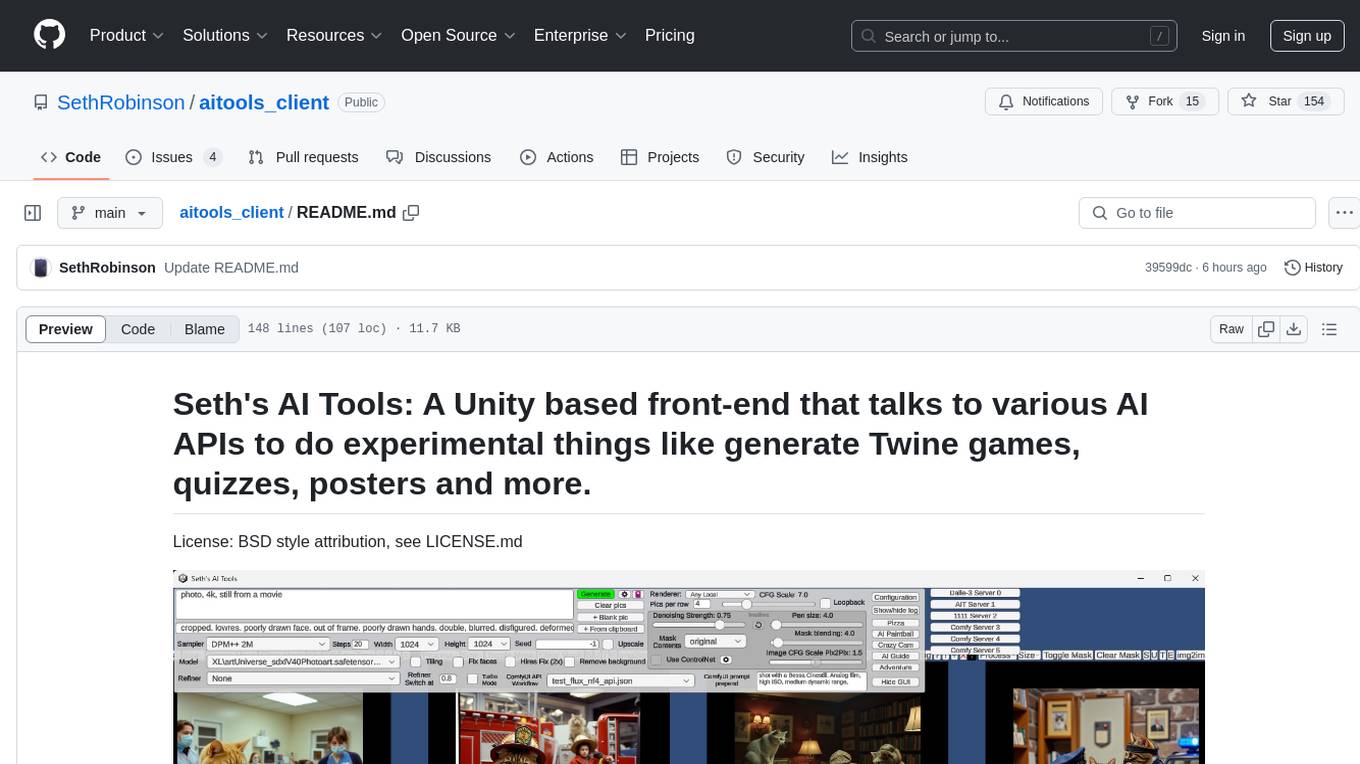
aitools_client
Seth's AI Tools is a Unity-based front-end that interfaces with various AI APIs to perform tasks such as generating Twine games, quizzes, posters, and more. The tool is a native Windows application that supports features like live update integration with image editors, text-to-image conversion, image processing, mask painting, and more. It allows users to connect to multiple servers for fast generation using GPUs and offers a neat workflow for evolving images in real-time. The tool respects user privacy by operating locally and includes built-in games and apps to test AI/SD capabilities. Additionally, it features an AI Guide for creating motivational posters and illustrated stories, as well as an Adventure mode with presets for generating web quizzes and Twine game projects.
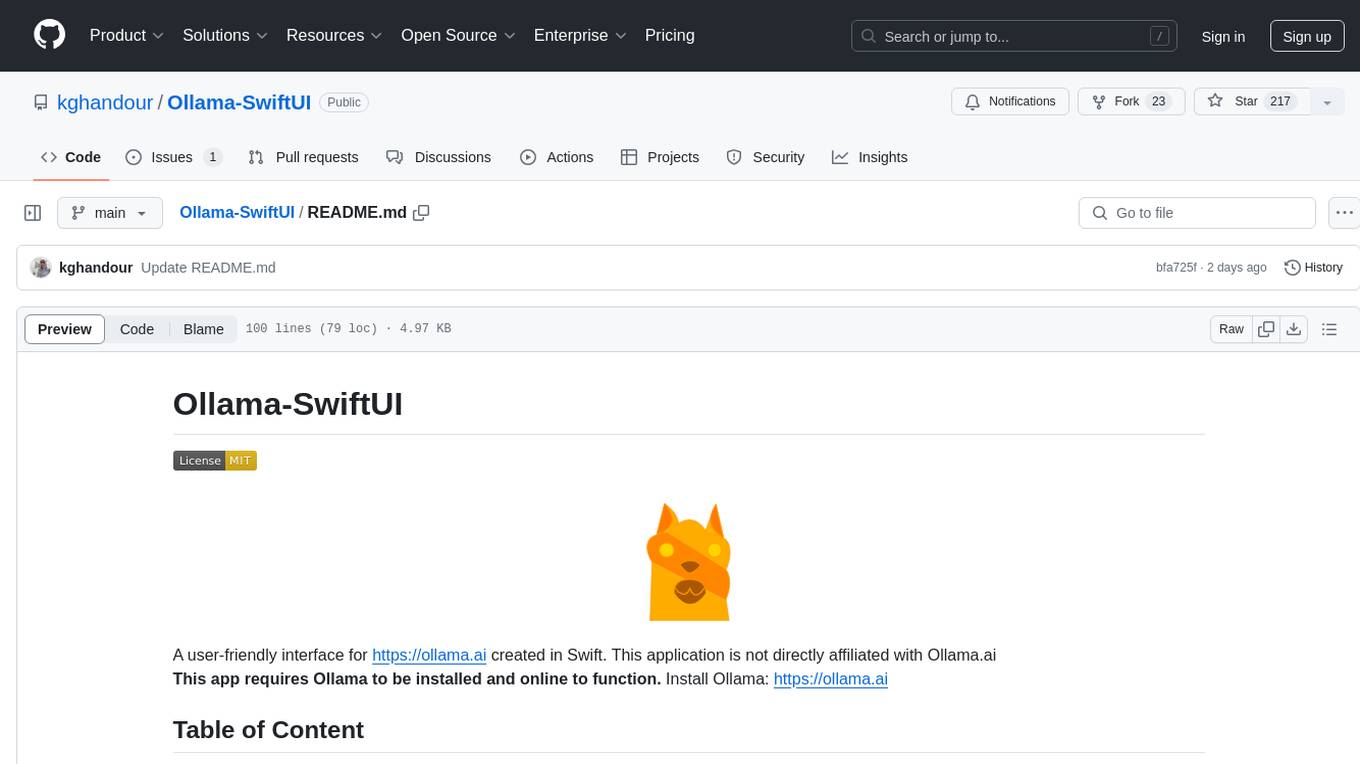
Ollama-SwiftUI
Ollama-SwiftUI is a user-friendly interface for Ollama.ai created in Swift. It allows seamless chatting with local Large Language Models on Mac. Users can change models mid-conversation, restart conversations, send system prompts, and use multimodal models with image + text. The app supports managing models, including downloading, deleting, and duplicating them. It offers light and dark mode, multiple conversation tabs, and a localized interface in English and Arabic.
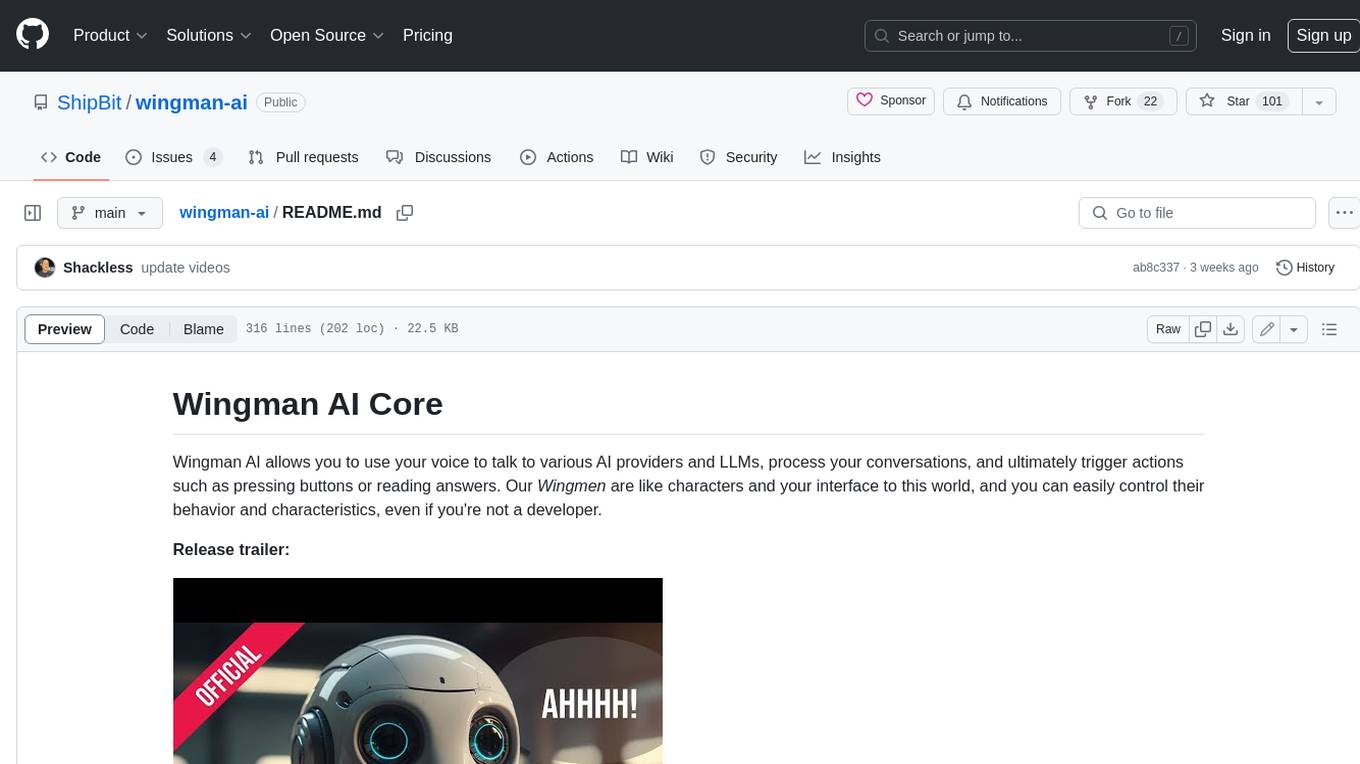
wingman-ai
Wingman AI allows you to use your voice to talk to various AI providers and LLMs, process your conversations, and ultimately trigger actions such as pressing buttons or reading answers. Our _Wingmen_ are like characters and your interface to this world, and you can easily control their behavior and characteristics, even if you're not a developer. AI is complex and it scares people. It's also **not just ChatGPT**. We want to make it as easy as possible for you to get started. That's what _Wingman AI_ is all about. It's a **framework** that allows you to build your own Wingmen and use them in your games and programs. The idea is simple, but the possibilities are endless. For example, you could: * **Role play** with an AI while playing for more immersion. Have air traffic control (ATC) in _Star Citizen_ or _Flight Simulator_. Talk to Shadowheart in Baldur's Gate 3 and have her respond in her own (cloned) voice. * Get live data such as trade information, build guides, or wiki content and have it read to you in-game by a _character_ and voice you control. * Execute keystrokes in games/applications and create complex macros. Trigger them in natural conversations with **no need for exact phrases.** The AI understands the context of your dialog and is quite _smart_ in recognizing your intent. Say _"It's raining! I can't see a thing!"_ and have it trigger a command you simply named _WipeVisors_. * Automate tasks on your computer * improve accessibility * ... and much more
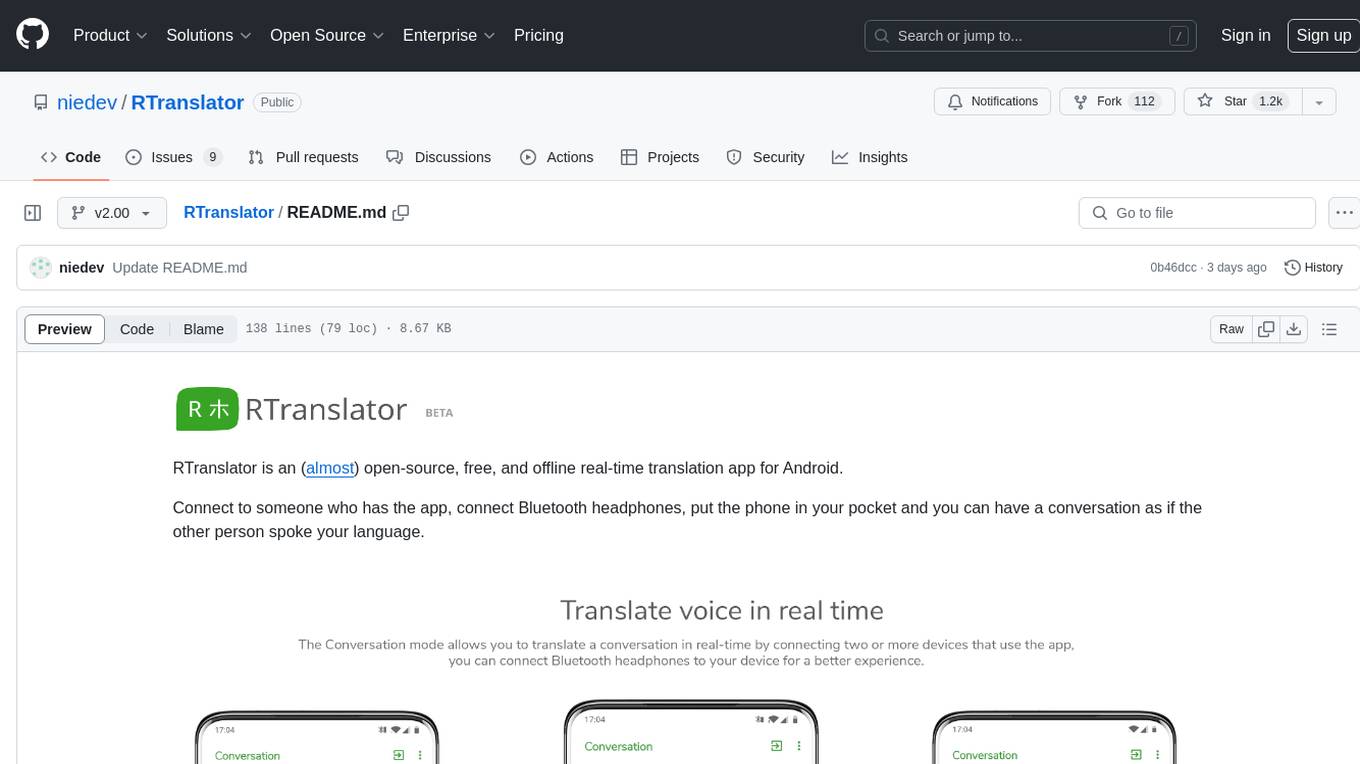
RTranslator
RTranslator is an almost open-source, free, and offline real-time translation app for Android. It offers Conversation mode for multi-user translations, WalkieTalkie mode for quick conversations, and Text translation mode. It uses Meta's NLLB for translation and OpenAi's Whisper for speech recognition, ensuring privacy. The app is optimized for performance and supports multiple languages. It is ad-free and donation-supported.
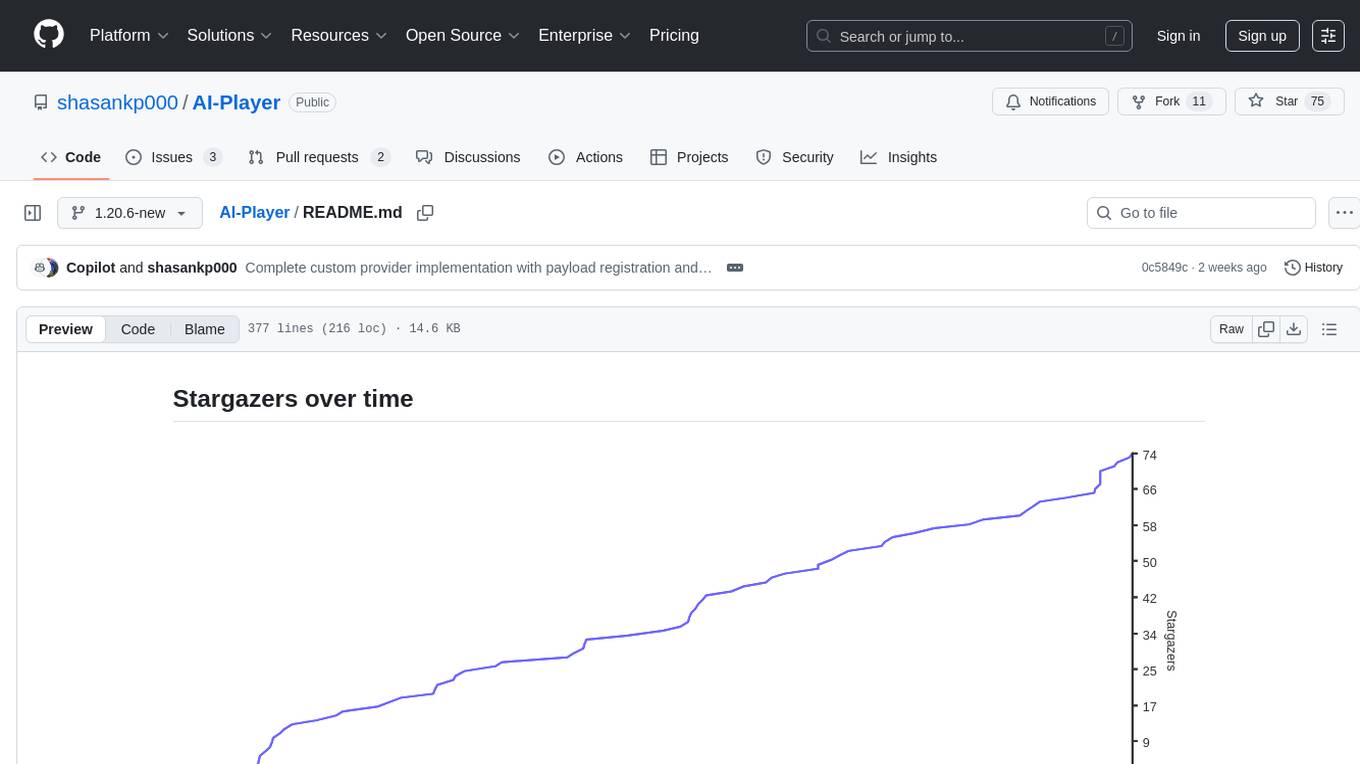
AI-Player
AI-Player is a Minecraft mod that adds an 'intelligent' second player to the game to combat loneliness while playing solo. It aims to enhance gameplay by providing companionship and interactive features. The mod leverages advanced AI algorithms and integrates with external tools to enhance the player experience. Developed with a focus on addressing the social aspect of gaming, AI-Player is a community-driven project that continues to evolve with user feedback and contributions.

CodeProject.AI-Server
CodeProject.AI Server is a standalone, self-hosted, fast, free, and open-source Artificial Intelligence microserver designed for any platform and language. It can be installed locally without the need for off-device or out-of-network data transfer, providing an easy-to-use solution for developers interested in AI programming. The server includes a HTTP REST API server, backend analysis services, and the source code, enabling users to perform various AI tasks locally without relying on external services or cloud computing. Current capabilities include object detection, face detection, scene recognition, sentiment analysis, and more, with ongoing feature expansions planned. The project aims to promote AI development, simplify AI implementation, focus on core use-cases, and leverage the expertise of the developer community.
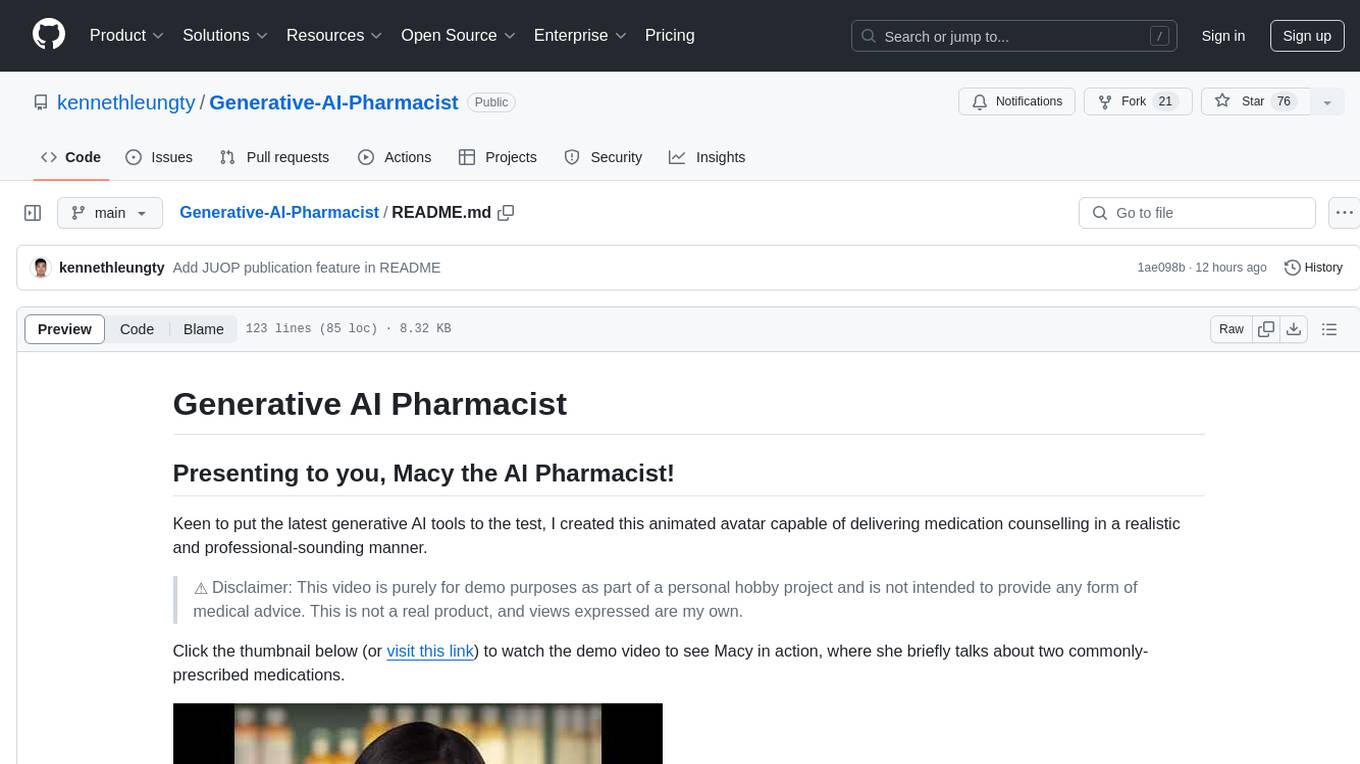
Generative-AI-Pharmacist
Generative AI Pharmacist is a project showcasing the use of generative AI tools to create an animated avatar named Macy, who delivers medication counseling in a realistic and professional manner. The project utilizes tools like Midjourney for image generation, ChatGPT for text generation, ElevenLabs for text-to-speech conversion, and D-ID for creating a photorealistic talking avatar video. The demo video featuring Macy discussing commonly-prescribed medications demonstrates the potential of generative AI in healthcare communication.
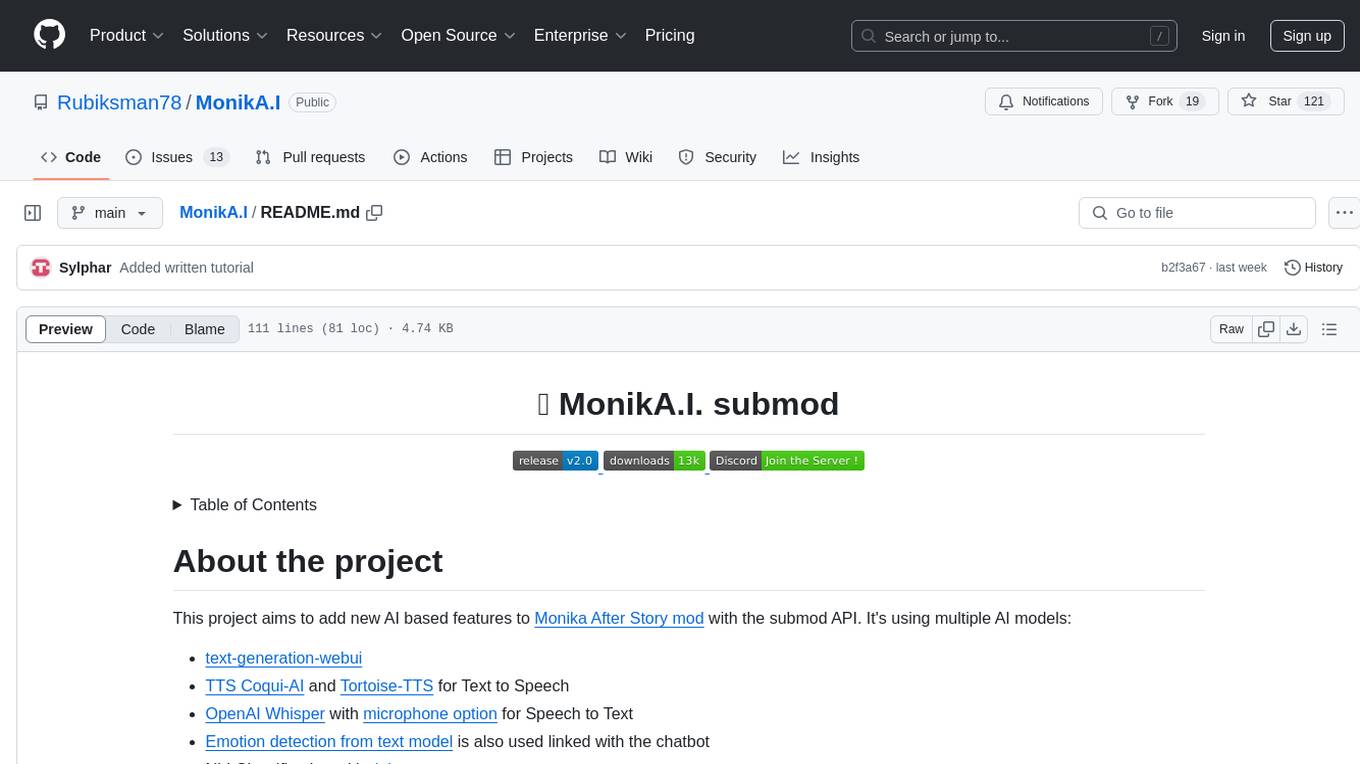
MonikA.I
MonikA.I. submod is a project that enhances Monika After Story mod with various AI features. It utilizes multiple AI models for text generation, text-to-speech, speech-to-text, emotion detection, and NLI classification. Users can interact with Monika through chatbots, voice commands, and game actions. The project is compatible with MAS v0.12.15 and supports Windows, Linux, and MacOS. It offers a user-friendly installation process and detailed usage instructions for different AI functionalities.
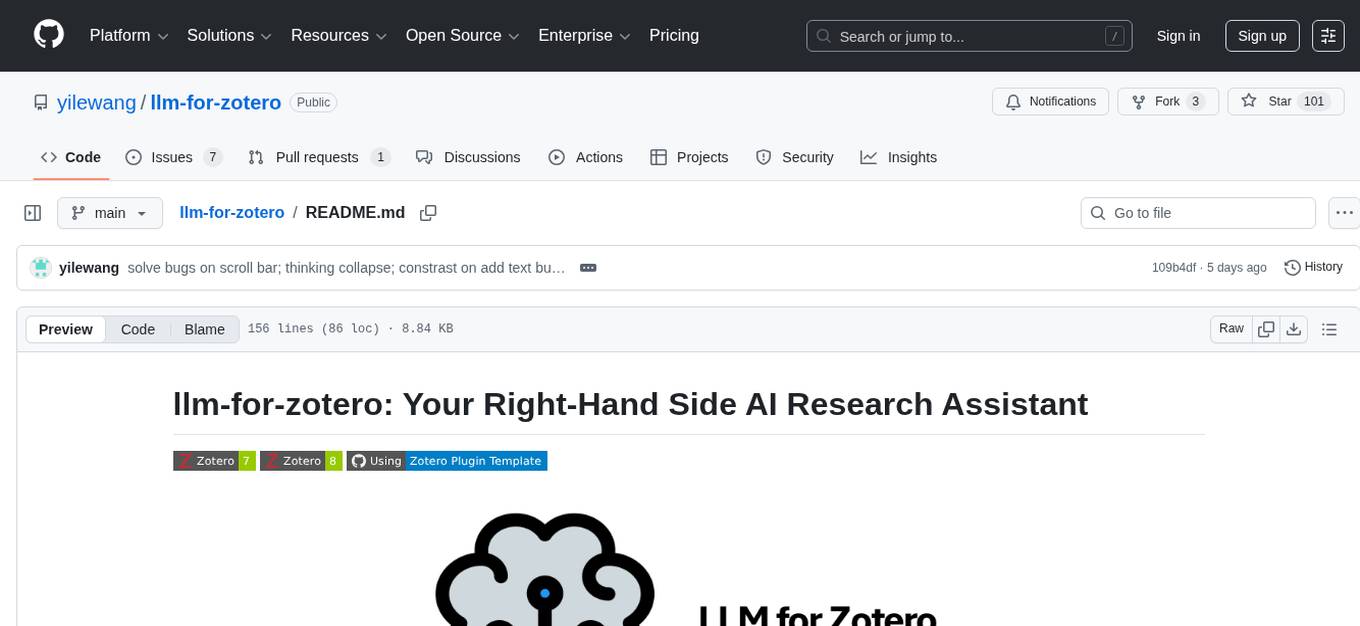
llm-for-zotero
llm-for-zotero is a powerful plugin for Zotero that integrates Large Language Models (LLMs) directly into the Zotero PDF reader. It provides features such as summarizing papers, explaining selected text, interpreting figures, saving notes, saving chat history, customizing quick-action presets, setting up LLM models, auto-updating, and more. The plugin aims to enhance the research experience by offering quick access to AI assistance within Zotero, eliminating the need to upload PDFs to external portals.
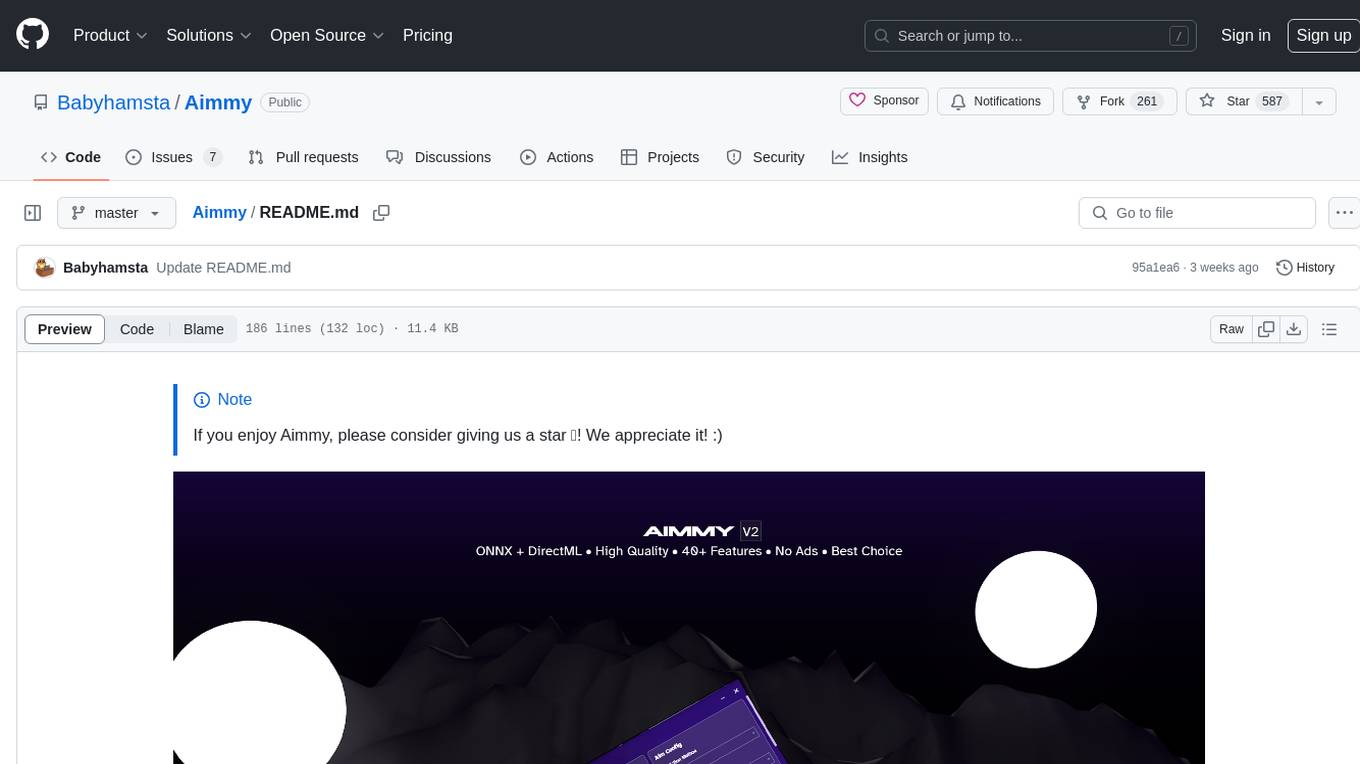
Aimmy
Aimmy is a universal AI-Based Aim Alignment Mechanism developed by BabyHamsta, MarsQQ & Taylor to make gaming more accessible for users who have difficulty aiming. It utilizes DirectML, ONNX, and YOLOV8 for player detection, offering high accuracy and fast performance. Aimmy features an easy-to-use UI, extensive customizability, and is free of ads and paywalls. It is designed for gamers facing challenges like physical or mental disabilities, poor hand-eye coordination, or aiming difficulties due to environmental factors. Aimmy provides various features like AI detection, customizability, anti-recoil system, mouse movement methods, hotswappability, and a model/configuration store with repository support.
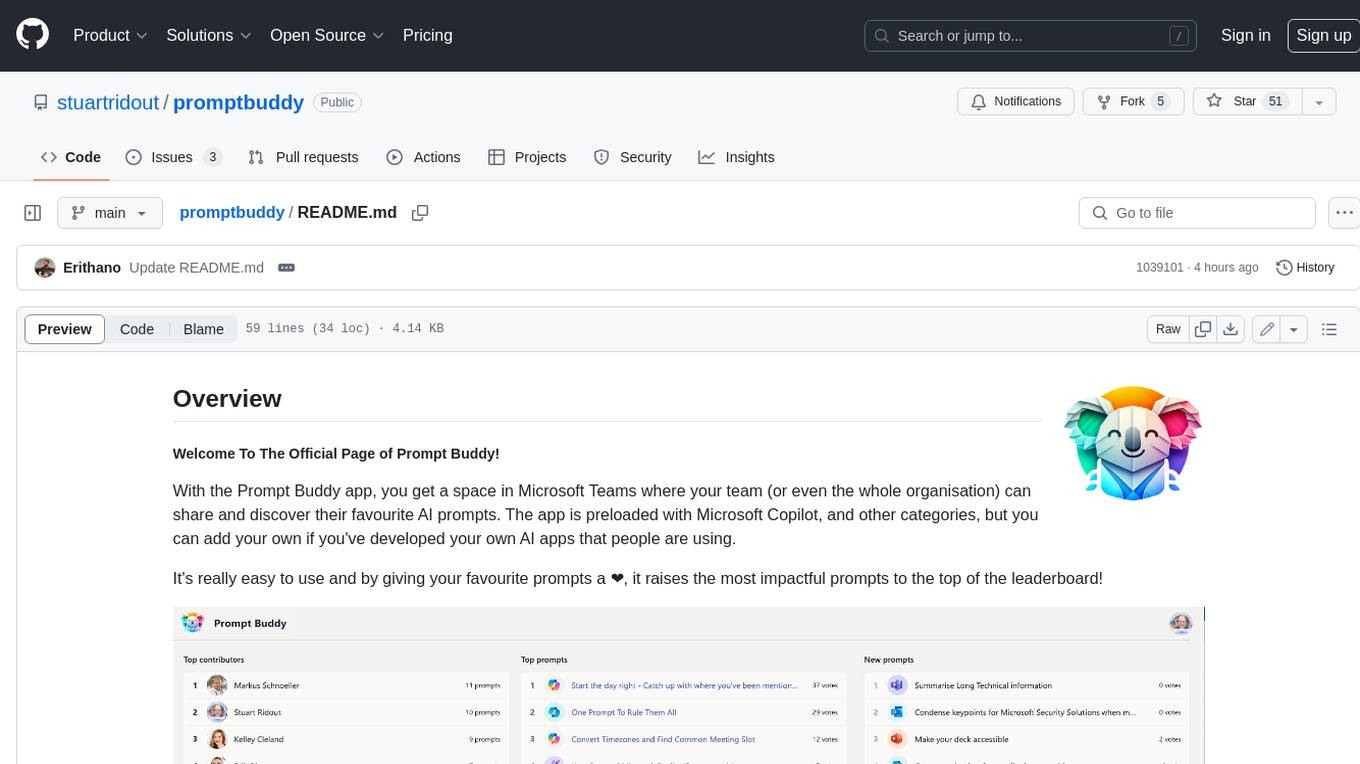
promptbuddy
Prompt Buddy is a Microsoft Teams app that provides a central location for teams to share and discover their favorite AI prompts. It comes preloaded with Microsoft Copilot and other categories, but users can also add their own custom prompts. The app is easy to use and allows users to upvote their favorite prompts, which raises them to the top of the leaderboard. Prompt Buddy also supports dark mode and offers a mobile layout for use on phones. It is built on the Power Platform and can be customized and extended by the installer.
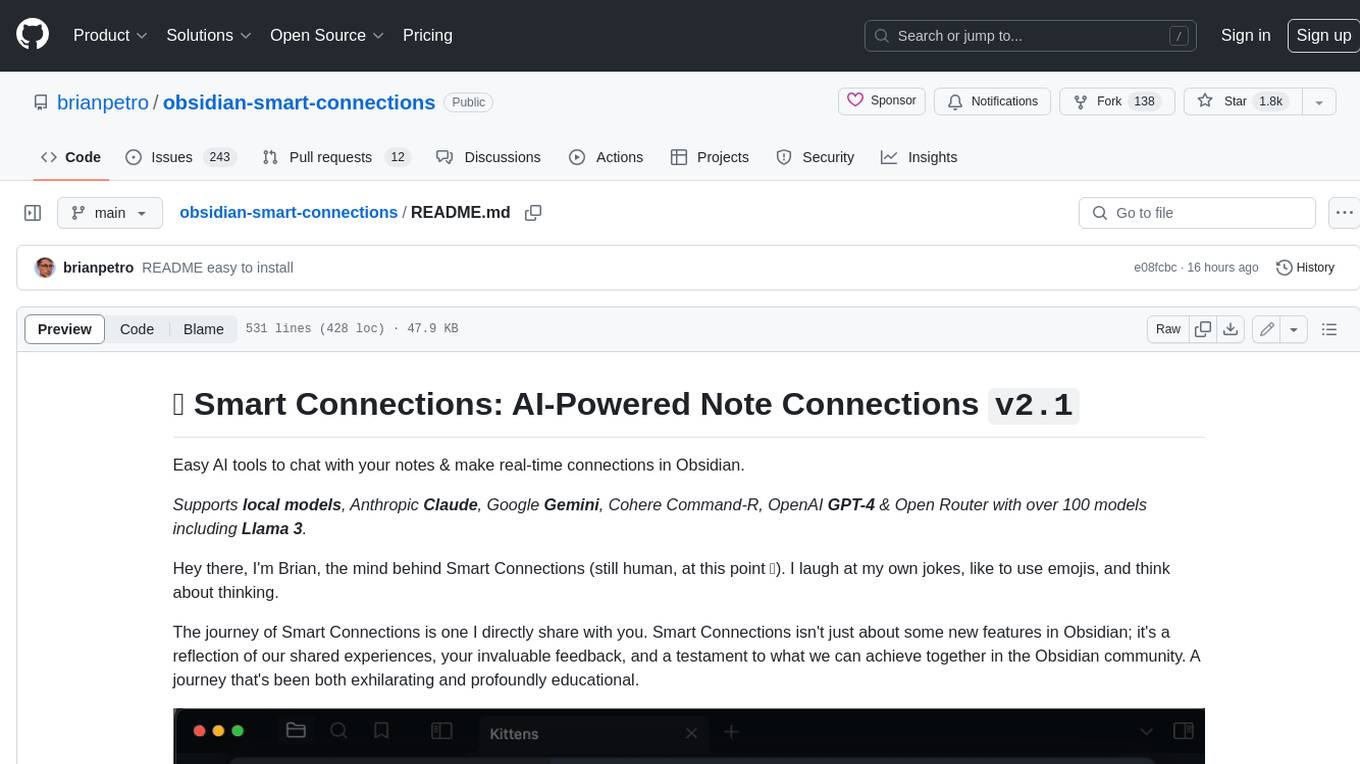
obsidian-smart-connections
Smart Connections is an AI-powered plugin for Obsidian that helps you discover hidden connections and insights in your notes. With features like Smart View for real-time relevant note suggestions and Smart Chat for chatting with your notes, Smart Connections makes it easier than ever to stay organized and uncover hidden connections between your notes. Its intuitive interface and customizable settings ensure a seamless experience, tailored to your unique needs and preferences.
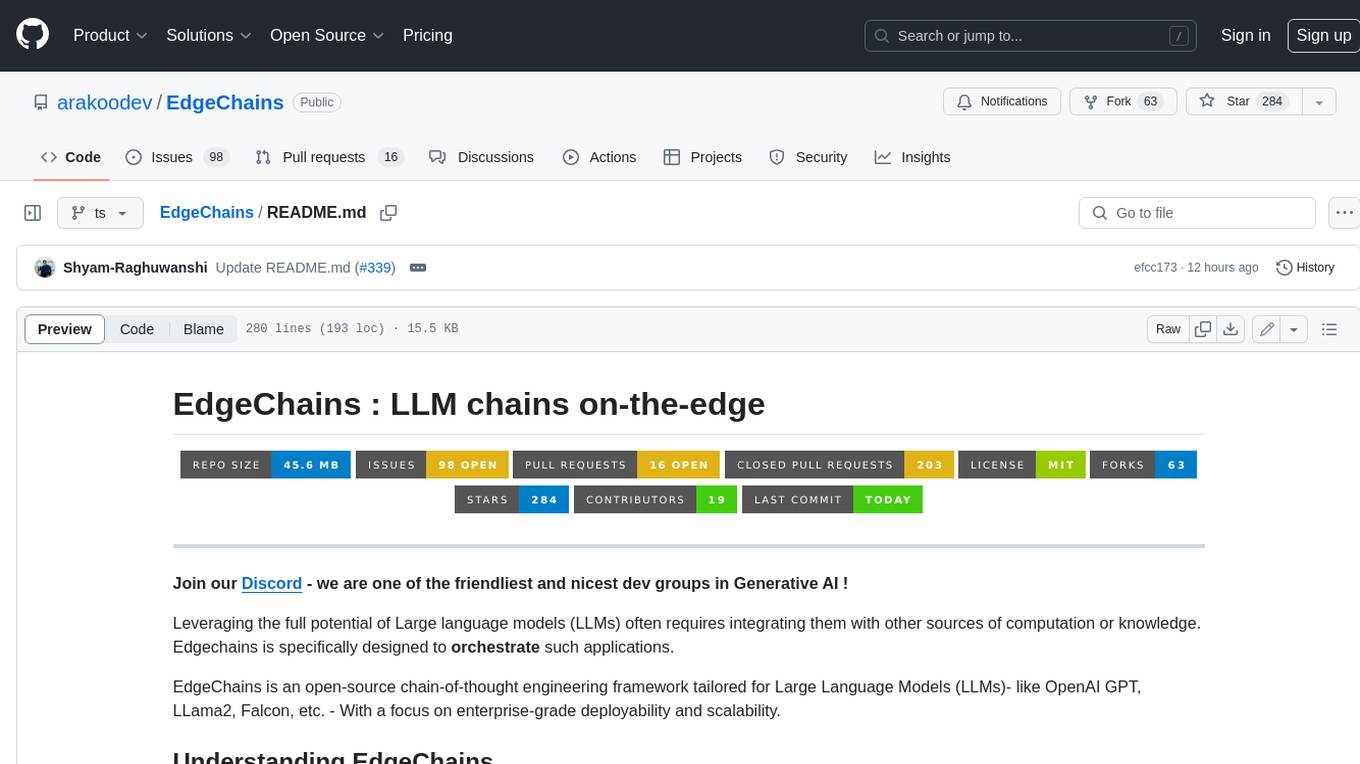
EdgeChains
EdgeChains is an open-source chain-of-thought engineering framework tailored for Large Language Models (LLMs)- like OpenAI GPT, LLama2, Falcon, etc. - With a focus on enterprise-grade deployability and scalability. EdgeChains is specifically designed to **orchestrate** such applications. At EdgeChains, we take a unique approach to Generative AI - we think Generative AI is a deployment and configuration management challenge rather than a UI and library design pattern challenge. We build on top of a tech that has solved this problem in a different domain - Kubernetes Config Management - and bring that to Generative AI. Edgechains is built on top of jsonnet, originally built by Google based on their experience managing a vast amount of configuration code in the Borg infrastructure.
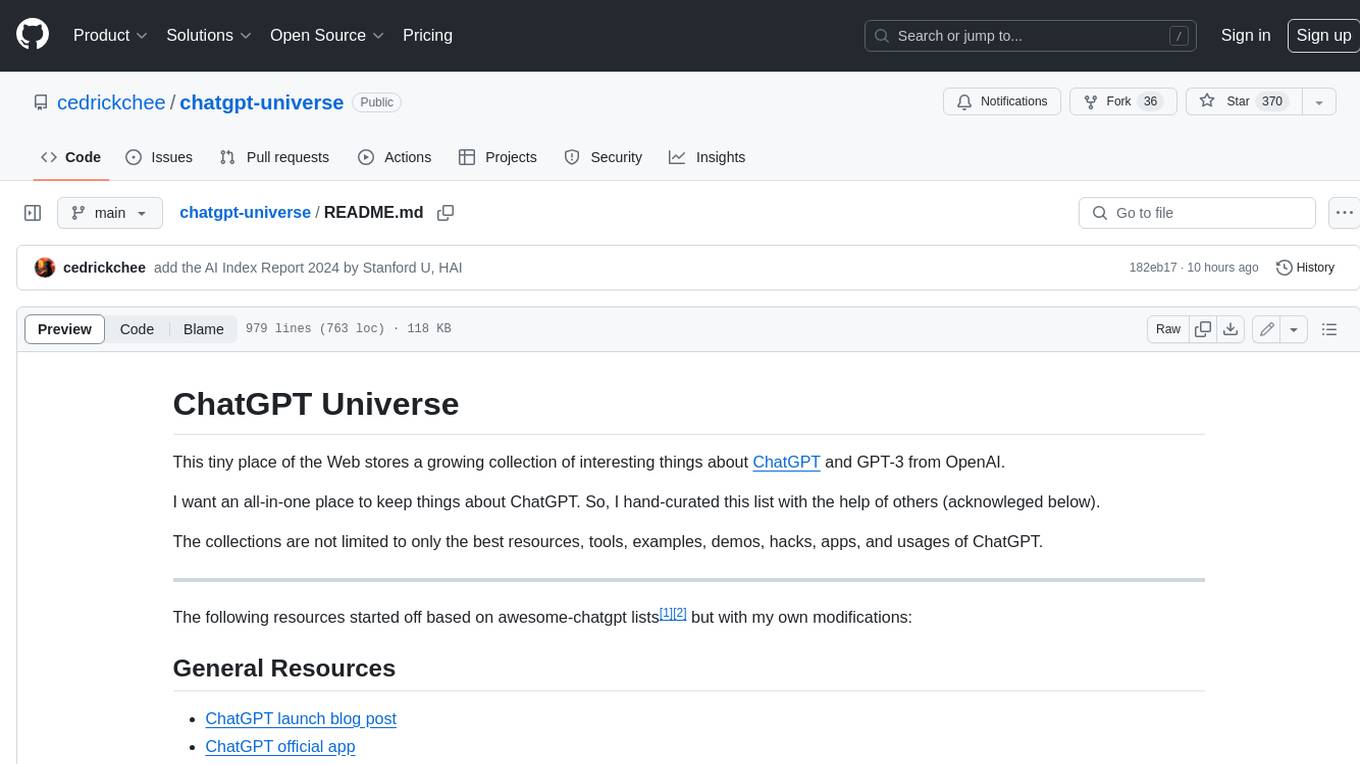
chatgpt-universe
ChatGPT is a large language model that can generate human-like text, translate languages, write different kinds of creative content, and answer your questions in a conversational way. It is trained on a massive amount of text data, and it is able to understand and respond to a wide range of natural language prompts. Here are 5 jobs suitable for this tool, in lowercase letters: 1. content writer 2. chatbot assistant 3. language translator 4. creative writer 5. researcher
For similar tasks

talk-to-chatgpt
Talk-To-ChatGPT is a Google Chrome and Microsoft Edge extension that enables users to interact with the ChatGPT AI using voice commands for speech recognition and text-to-speech responses. The tool enhances the conversational experience by allowing users to speak to the AI and receive spoken responses, making interactions more natural and engaging. It also supports ElevenLabs API integration for creating custom voices for text-to-speech. The extension provides settings for voice, language, and more, and can be installed from the Chrome and Edge web stores or manually. While the project has been discontinued due to upcoming desktop apps from OpenAI, it has been used to assist individuals with disabilities and the elderly in interacting with ChatGPT.

h2ogpt
h2oGPT is an Apache V2 open-source project that allows users to query and summarize documents or chat with local private GPT LLMs. It features a private offline database of any documents (PDFs, Excel, Word, Images, Video Frames, Youtube, Audio, Code, Text, MarkDown, etc.), a persistent database (Chroma, Weaviate, or in-memory FAISS) using accurate embeddings (instructor-large, all-MiniLM-L6-v2, etc.), and efficient use of context using instruct-tuned LLMs (no need for LangChain's few-shot approach). h2oGPT also offers parallel summarization and extraction, reaching an output of 80 tokens per second with the 13B LLaMa2 model, HYDE (Hypothetical Document Embeddings) for enhanced retrieval based upon LLM responses, a variety of models supported (LLaMa2, Mistral, Falcon, Vicuna, WizardLM. With AutoGPTQ, 4-bit/8-bit, LORA, etc.), GPU support from HF and LLaMa.cpp GGML models, and CPU support using HF, LLaMa.cpp, and GPT4ALL models. Additionally, h2oGPT provides Attention Sinks for arbitrarily long generation (LLaMa-2, Mistral, MPT, Pythia, Falcon, etc.), a UI or CLI with streaming of all models, the ability to upload and view documents through the UI (control multiple collaborative or personal collections), Vision Models LLaVa, Claude-3, Gemini-Pro-Vision, GPT-4-Vision, Image Generation Stable Diffusion (sdxl-turbo, sdxl) and PlaygroundAI (playv2), Voice STT using Whisper with streaming audio conversion, Voice TTS using MIT-Licensed Microsoft Speech T5 with multiple voices and Streaming audio conversion, Voice TTS using MPL2-Licensed TTS including Voice Cloning and Streaming audio conversion, AI Assistant Voice Control Mode for hands-free control of h2oGPT chat, Bake-off UI mode against many models at the same time, Easy Download of model artifacts and control over models like LLaMa.cpp through the UI, Authentication in the UI by user/password via Native or Google OAuth, State Preservation in the UI by user/password, Linux, Docker, macOS, and Windows support, Easy Windows Installer for Windows 10 64-bit (CPU/CUDA), Easy macOS Installer for macOS (CPU/M1/M2), Inference Servers support (oLLaMa, HF TGI server, vLLM, Gradio, ExLLaMa, Replicate, OpenAI, Azure OpenAI, Anthropic), OpenAI-compliant, Server Proxy API (h2oGPT acts as drop-in-replacement to OpenAI server), Python client API (to talk to Gradio server), JSON Mode with any model via code block extraction. Also supports MistralAI JSON mode, Claude-3 via function calling with strict Schema, OpenAI via JSON mode, and vLLM via guided_json with strict Schema, Web-Search integration with Chat and Document Q/A, Agents for Search, Document Q/A, Python Code, CSV frames (Experimental, best with OpenAI currently), Evaluate performance using reward models, and Quality maintained with over 1000 unit and integration tests taking over 4 GPU-hours.

serverless-chat-langchainjs
This sample shows how to build a serverless chat experience with Retrieval-Augmented Generation using LangChain.js and Azure. The application is hosted on Azure Static Web Apps and Azure Functions, with Azure Cosmos DB for MongoDB vCore as the vector database. You can use it as a starting point for building more complex AI applications.

react-native-vercel-ai
Run Vercel AI package on React Native, Expo, Web and Universal apps. Currently React Native fetch API does not support streaming which is used as a default on Vercel AI. This package enables you to use AI library on React Native but the best usage is when used on Expo universal native apps. On mobile you get back responses without streaming with the same API of `useChat` and `useCompletion` and on web it will fallback to `ai/react`

LLamaSharp
LLamaSharp is a cross-platform library to run 🦙LLaMA/LLaVA model (and others) on your local device. Based on llama.cpp, inference with LLamaSharp is efficient on both CPU and GPU. With the higher-level APIs and RAG support, it's convenient to deploy LLM (Large Language Model) in your application with LLamaSharp.

gpt4all
GPT4All is an ecosystem to run powerful and customized large language models that work locally on consumer grade CPUs and any GPU. Note that your CPU needs to support AVX or AVX2 instructions. Learn more in the documentation. A GPT4All model is a 3GB - 8GB file that you can download and plug into the GPT4All open-source ecosystem software. Nomic AI supports and maintains this software ecosystem to enforce quality and security alongside spearheading the effort to allow any person or enterprise to easily train and deploy their own on-edge large language models.

ChatGPT-Telegram-Bot
ChatGPT Telegram Bot is a Telegram bot that provides a smooth AI experience. It supports both Azure OpenAI and native OpenAI, and offers real-time (streaming) response to AI, with a faster and smoother experience. The bot also has 15 preset bot identities that can be quickly switched, and supports custom bot identities to meet personalized needs. Additionally, it supports clearing the contents of the chat with a single click, and restarting the conversation at any time. The bot also supports native Telegram bot button support, making it easy and intuitive to implement required functions. User level division is also supported, with different levels enjoying different single session token numbers, context numbers, and session frequencies. The bot supports English and Chinese on UI, and is containerized for easy deployment.

twinny
Twinny is a free and open-source AI code completion plugin for Visual Studio Code and compatible editors. It integrates with various tools and frameworks, including Ollama, llama.cpp, oobabooga/text-generation-webui, LM Studio, LiteLLM, and Open WebUI. Twinny offers features such as fill-in-the-middle code completion, chat with AI about your code, customizable API endpoints, and support for single or multiline fill-in-middle completions. It is easy to install via the Visual Studio Code extensions marketplace and provides a range of customization options. Twinny supports both online and offline operation and conforms to the OpenAI API standard.
For similar jobs
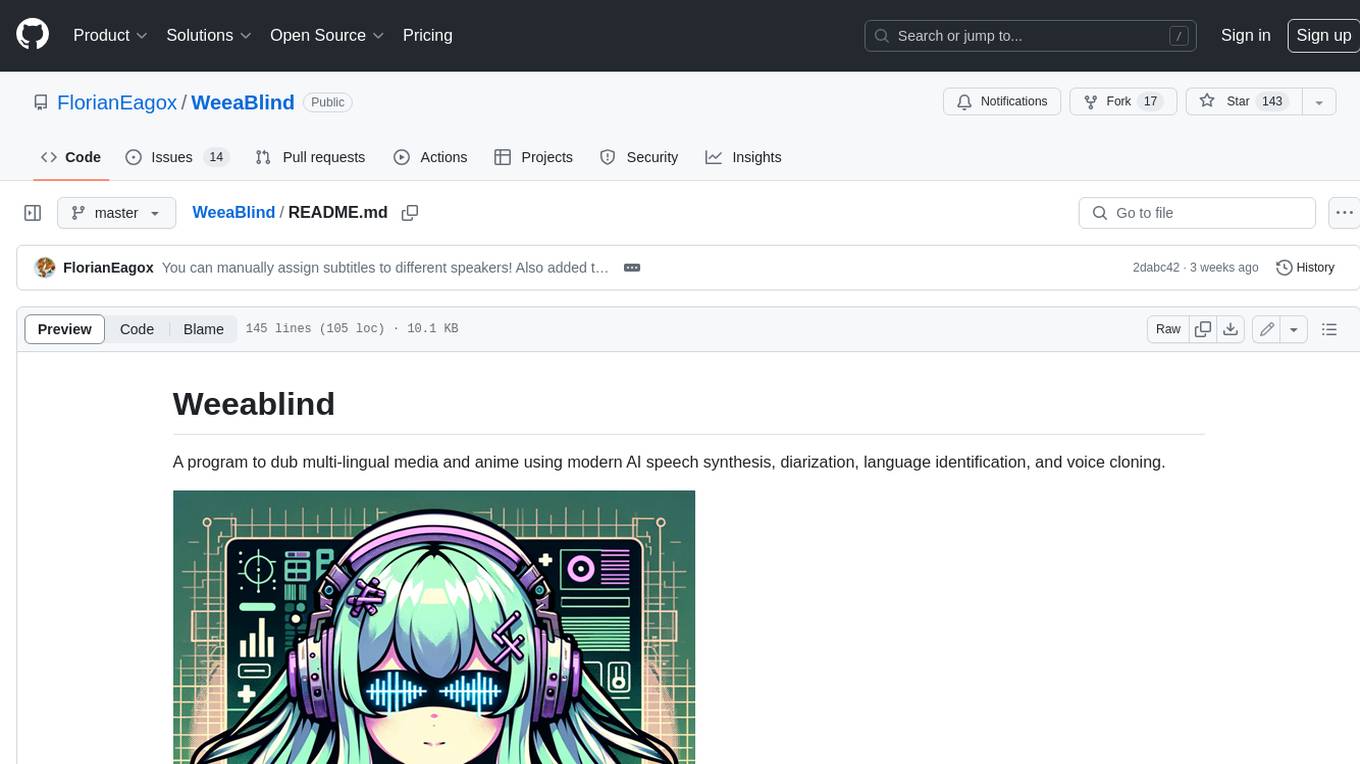
WeeaBlind
Weeablind is a program that uses modern AI speech synthesis, diarization, language identification, and voice cloning to dub multi-lingual media and anime. It aims to create a pleasant alternative for folks facing accessibility hurdles such as blindness, dyslexia, learning disabilities, or simply those that don't enjoy reading subtitles. The program relies on state-of-the-art technologies such as ffmpeg, pydub, Coqui TTS, speechbrain, and pyannote.audio to analyze and synthesize speech that stays in-line with the source video file. Users have the option of dubbing every subtitle in the video, setting the start and end times, dubbing only foreign-language content, or full-blown multi-speaker dubbing with speaking rate and volume matching.

talk-to-chatgpt
Talk-To-ChatGPT is a Google Chrome and Microsoft Edge extension that enables users to interact with the ChatGPT AI using voice commands for speech recognition and text-to-speech responses. The tool enhances the conversational experience by allowing users to speak to the AI and receive spoken responses, making interactions more natural and engaging. It also supports ElevenLabs API integration for creating custom voices for text-to-speech. The extension provides settings for voice, language, and more, and can be installed from the Chrome and Edge web stores or manually. While the project has been discontinued due to upcoming desktop apps from OpenAI, it has been used to assist individuals with disabilities and the elderly in interacting with ChatGPT.

weave
Weave is a toolkit for developing Generative AI applications, built by Weights & Biases. With Weave, you can log and debug language model inputs, outputs, and traces; build rigorous, apples-to-apples evaluations for language model use cases; and organize all the information generated across the LLM workflow, from experimentation to evaluations to production. Weave aims to bring rigor, best-practices, and composability to the inherently experimental process of developing Generative AI software, without introducing cognitive overhead.

LLMStack
LLMStack is a no-code platform for building generative AI agents, workflows, and chatbots. It allows users to connect their own data, internal tools, and GPT-powered models without any coding experience. LLMStack can be deployed to the cloud or on-premise and can be accessed via HTTP API or triggered from Slack or Discord.

VisionCraft
The VisionCraft API is a free API for using over 100 different AI models. From images to sound.

kaito
Kaito is an operator that automates the AI/ML inference model deployment in a Kubernetes cluster. It manages large model files using container images, avoids tuning deployment parameters to fit GPU hardware by providing preset configurations, auto-provisions GPU nodes based on model requirements, and hosts large model images in the public Microsoft Container Registry (MCR) if the license allows. Using Kaito, the workflow of onboarding large AI inference models in Kubernetes is largely simplified.

PyRIT
PyRIT is an open access automation framework designed to empower security professionals and ML engineers to red team foundation models and their applications. It automates AI Red Teaming tasks to allow operators to focus on more complicated and time-consuming tasks and can also identify security harms such as misuse (e.g., malware generation, jailbreaking), and privacy harms (e.g., identity theft). The goal is to allow researchers to have a baseline of how well their model and entire inference pipeline is doing against different harm categories and to be able to compare that baseline to future iterations of their model. This allows them to have empirical data on how well their model is doing today, and detect any degradation of performance based on future improvements.

tabby
Tabby is a self-hosted AI coding assistant, offering an open-source and on-premises alternative to GitHub Copilot. It boasts several key features: * Self-contained, with no need for a DBMS or cloud service. * OpenAPI interface, easy to integrate with existing infrastructure (e.g Cloud IDE). * Supports consumer-grade GPUs.




